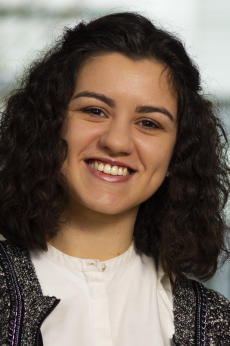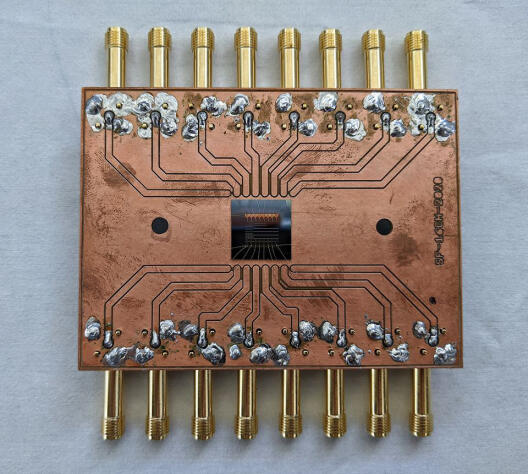
Integrated Optics for Quantum Computing
Emma Lomonte, Ph.D. student in Research Group Pernice
Research: "My research is in integrated optics. We do nanofabrication. I truly enjoy working in the cleanroom doing the whole fabrication process from start to finish, making a chip that you can finally measure. I work closely with Francesco Lenzini (Postdoc) in a team. Right now, we are testing a new and very promising material with several applications in quantum optics, trying to find the best fabrication process to achieve low-loss and high-performance devices. It is an ongoing and very exciting project!"
Why I became a scientist: "I studied Physics because I was curious about the “principles of operation” of nature, and, among all its branches, I like photonics because I feel like I am doing something that may have an influence on the future: photonic devices might be something that the next generation will use."
Likes about the SoN: "The cleanroom (Münster Nanofabrication Facility): having all these machines in one place is not common. Here we can do nanofabrication of very complex chips from the very first to the last steps. There are not many other locations in Europe that are comparable."

Previous workplace: "I got a Bachelor’s and Master’s degree in Physics at the University of Pavia (Italy). Thanks to the Erasmus+ program funded by the European Union, I had the chance to join the group of Prof. Pernice here in Münster and discover the fascinating world of nanofabrication. In Italy I could have applied for a PhD position or gotten a job somewhere, but I wanted to come back to Germany. Indeed, here I have the opportunity to do something strongly related to what I studied and at the same time be paid well, which allows me to have an enjoyable life outside my workplace also. In Italy, some colleagues of mine studied very hard and, now, with their current salaries they can barely afford to cover all their monthly expenses.
On the other hand, in Italy we are a bit more relaxed. For example, in my experience, during a lunch break people enjoy chatting about outside-of-work stuff, while here, during the lunch break there is almost never the chance to switch off for an hour.
Also, in Italy we had lectures in English, even though everyone was Italian. The language of science is English. Germans would complain if in Italy things weren’t in English, so why is everything in German here? It’s hard to build and integrate into a community here when people can, but don’t want to speak English. The language barrier is too big. I am taking a German class in my free time, but it is impossible to learn German in one month."
Wishes: a large, shared common space with vending machines and English as the working language.
Links:
Research Group Pernice
Münster Nanofabrication Facility (MNF)

